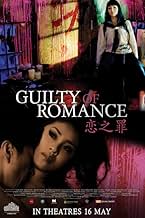IMDb-BEWERTUNG
6,8/10
6209
IHRE BEWERTUNG
Füge eine Handlung in deiner Sprache hinzuWhen a woman is found dead in an abandoned apartment in a hotel neighborhood in Maruyama-cho, Shibuya, Tokyo, police officer Kasuko focuses his investigation on two respectable women who are... Alles lesenWhen a woman is found dead in an abandoned apartment in a hotel neighborhood in Maruyama-cho, Shibuya, Tokyo, police officer Kasuko focuses his investigation on two respectable women who are not what they seem.When a woman is found dead in an abandoned apartment in a hotel neighborhood in Maruyama-cho, Shibuya, Tokyo, police officer Kasuko focuses his investigation on two respectable women who are not what they seem.
- Regie
- Drehbuch
- Hauptbesetzung
- Auszeichnungen
- 1 Gewinn & 1 Nominierung insgesamt
Satoshi Nikaido
- Masao Yoshida
- (as Satoshi Nikaidô)
Marie Machida
- Mari
- (as Marî Machida)
Empfohlene Bewertungen
You know Sono. You know that he doesn't want films to be easy. You know he doesn't care about your feelings. You know that he wants to tell you much more than "blood and tits", even if some people can't pass that layer.
This is a difficult one, but again, it delivers, makes you think about everything he wanted to say. Great performance and visuals.
This is a difficult one, but again, it delivers, makes you think about everything he wanted to say. Great performance and visuals.
After really enjoying Cold Fish at this years Melbourne International Film Festival, I went ahead and got a ticket to a screening of Guilty of Romance.
The only thing that really held my interest (and stopped me from walking out of the cinema) was the gorgeous Megumi Kagurazaka. Outside of this, I found GOR to be underwritten and pretentious.
Didn't care about any of the characters and the stories of three Japanese women quickly became laboured. Overly long scenes, characters shouting at each other, ridiculous literary quotes, a half baked attempt to add a crime caper twist, some kind of messages about modern feminism in Japan? Everything becomes muddled and there is simply no emotion here. Granted I am an Anglo Aussie so I can only assume I am missing much by not being Japanese and understanding their culture.
As a film, Cold Fish was in another league compared to this sorry, overblown mess.
The only thing that really held my interest (and stopped me from walking out of the cinema) was the gorgeous Megumi Kagurazaka. Outside of this, I found GOR to be underwritten and pretentious.
Didn't care about any of the characters and the stories of three Japanese women quickly became laboured. Overly long scenes, characters shouting at each other, ridiculous literary quotes, a half baked attempt to add a crime caper twist, some kind of messages about modern feminism in Japan? Everything becomes muddled and there is simply no emotion here. Granted I am an Anglo Aussie so I can only assume I am missing much by not being Japanese and understanding their culture.
As a film, Cold Fish was in another league compared to this sorry, overblown mess.
Very unusual and intriguing.
Starts off incredibly well - edgy, very interesting, and doesn't give much away. The transformation of the author's wife is captivating, and has many lessons in liberty, self-will, individualism and their consequences.
However, the second act is confusing, drags on a bit and the plot is not entirely water-tight. Some things just seem added in for shock or weirdness value.
The conclusion is good and closes the loop well, though leaving room for a continuing moral.
Solid performances all round.
Starts off incredibly well - edgy, very interesting, and doesn't give much away. The transformation of the author's wife is captivating, and has many lessons in liberty, self-will, individualism and their consequences.
However, the second act is confusing, drags on a bit and the plot is not entirely water-tight. Some things just seem added in for shock or weirdness value.
The conclusion is good and closes the loop well, though leaving room for a continuing moral.
Solid performances all round.
I loved the concept of the movie and some scenes were effective and haunting but I thought that it was somewhat dissociated.
The editing felt a bit weird to me, as if someone used material from two different movies.
A barbaric murder occurs in a love hotel district of Tokyo, and Kazuko Yoshida leads the investigative team, her story interweaving with that of Izumi, the wife of a renowned writer. Izumi leads a banal existence of no excitement, constantly at the behest of her exacting husband. Trying to break the monotony, she gets a job, where a modelling agent spies her beauty and naivety. Izumi is then lured into the world of pornographic modelling, and soon is deep inside the underground sex industry, surrounded by degenerates and curs. A woman named Mitsuko takes Izumi under her wing, but whether or not Mitsuko's plans for Izumi are honorable- and how their story links in with Kazuko's- remains to be seen in Sion Sono's 'Guilty of Romance.'
Inspired by the infamous Yasuko Watanabe case, 'Guilty of Romance' is a hard-hitting, sinister drama that is quite depressing and absolutely riveting. Sono's tale paints a portrait of a profoundly sad, lonely woman trying to find a sense of agency in her life, and how she is ultimately corrupted and exploited by a society built on self-interest and full of vacuous cads. It is gritty and devastating, though it must be said that the latter part of the film gets rather muddled and contrived.
The simple poignancy of Izumi's tale is slightly obscured by all the sound and fury of the second half, full of twists and turns that feel unnecessary and trite. That said, the film as a whole is still powerful, and at close to two and a half hours; it's not surprising that 'Guilty of Romance' lags in places.
Cinematographer Sôhei Tanikawa and Sono have worked together numerous times, their collaborations usually resulting in striking visuals that one remembers long after seeing them. Such is the case with 'Guilty of Romance;' it is a neon-soaked feast for the eyes. The use of colour in the film is particularly effective and artistic, as well as Tanikawa's work with light and shadow and the composition and framing of images on screen. Tanikawa's efforts add unquestionable power to scenes, and is very memorable.
Jun'ichi Itô's editing is restrained but alert work, he allows scenes play in their own time, but doesn't let things drag out. The film also benefits from Chiyoe Hakamada's costume design, which is understated and evocative. The clothing she designed for Mitsuko is particularly strong, with the outfits adding depth to the character and suiting the dual sides of her personality perfectly. Also of note is Yasuhiro Morinaga's muted score, which is dramatic and atmospheric, lending to the proceedings a tragic air most in keeping with the subject matter.
'Guilty of Romance' has a cast all performing at the top of their games. Megumi Kagurazaka stars as Izumi, giving a multi-faceted, subtle performance both alluring and affecting. She portrays the character as she undergoes a remarkable change from naïve housewife to grande horizontale masterfully, remaining sympathetic throughout. It is a brave performance many others couldn't pull off, and Kagurazaka does it with an enviable, enrapturing ease and grace.
Makoto Togashi co-stars as Mitsuko, an incredibly complicated and dangerous woman, delivering a performance of great intensity and strength. She is frankly terrifying at times, and is clearly enjoying playing such an unhinged character. She imbues Mitsuko with much depth, however, making her a believable creation, as well as a frightening one. Not in the film until roughly the halfway mark, as soon as Togashi is on-screen she draws your attention and keeps it held.
Miki Mizuno also stars, as the policewoman Kazuko, and though her story is less interesting, Mizuno performs well, leaving an indelible impression on the viewer. From the supporting cast, Kanji Tsuda and Ryûju Kobayashi stand out, giving two strong performances as Izumi's husband- who has his own secrets- and a seedy pimp with a fondness for pink paint, respectively.
'Guilty of Romance' is a dark drama that is difficult to watch in places, but always captivating. Though the story loses steam in the last act, the power of the narrative is not overly hampered. Strongly acted and featuring striking visuals from Sôhei Tanikawa, it is an experience not easily forgotten. The film may be guilty of having a weak last act and a bad title, but on all other charges it is innocent; apart from the charge of being powerful, absorbing cinema. Of that, it is guilty on all counts.
Inspired by the infamous Yasuko Watanabe case, 'Guilty of Romance' is a hard-hitting, sinister drama that is quite depressing and absolutely riveting. Sono's tale paints a portrait of a profoundly sad, lonely woman trying to find a sense of agency in her life, and how she is ultimately corrupted and exploited by a society built on self-interest and full of vacuous cads. It is gritty and devastating, though it must be said that the latter part of the film gets rather muddled and contrived.
The simple poignancy of Izumi's tale is slightly obscured by all the sound and fury of the second half, full of twists and turns that feel unnecessary and trite. That said, the film as a whole is still powerful, and at close to two and a half hours; it's not surprising that 'Guilty of Romance' lags in places.
Cinematographer Sôhei Tanikawa and Sono have worked together numerous times, their collaborations usually resulting in striking visuals that one remembers long after seeing them. Such is the case with 'Guilty of Romance;' it is a neon-soaked feast for the eyes. The use of colour in the film is particularly effective and artistic, as well as Tanikawa's work with light and shadow and the composition and framing of images on screen. Tanikawa's efforts add unquestionable power to scenes, and is very memorable.
Jun'ichi Itô's editing is restrained but alert work, he allows scenes play in their own time, but doesn't let things drag out. The film also benefits from Chiyoe Hakamada's costume design, which is understated and evocative. The clothing she designed for Mitsuko is particularly strong, with the outfits adding depth to the character and suiting the dual sides of her personality perfectly. Also of note is Yasuhiro Morinaga's muted score, which is dramatic and atmospheric, lending to the proceedings a tragic air most in keeping with the subject matter.
'Guilty of Romance' has a cast all performing at the top of their games. Megumi Kagurazaka stars as Izumi, giving a multi-faceted, subtle performance both alluring and affecting. She portrays the character as she undergoes a remarkable change from naïve housewife to grande horizontale masterfully, remaining sympathetic throughout. It is a brave performance many others couldn't pull off, and Kagurazaka does it with an enviable, enrapturing ease and grace.
Makoto Togashi co-stars as Mitsuko, an incredibly complicated and dangerous woman, delivering a performance of great intensity and strength. She is frankly terrifying at times, and is clearly enjoying playing such an unhinged character. She imbues Mitsuko with much depth, however, making her a believable creation, as well as a frightening one. Not in the film until roughly the halfway mark, as soon as Togashi is on-screen she draws your attention and keeps it held.
Miki Mizuno also stars, as the policewoman Kazuko, and though her story is less interesting, Mizuno performs well, leaving an indelible impression on the viewer. From the supporting cast, Kanji Tsuda and Ryûju Kobayashi stand out, giving two strong performances as Izumi's husband- who has his own secrets- and a seedy pimp with a fondness for pink paint, respectively.
'Guilty of Romance' is a dark drama that is difficult to watch in places, but always captivating. Though the story loses steam in the last act, the power of the narrative is not overly hampered. Strongly acted and featuring striking visuals from Sôhei Tanikawa, it is an experience not easily forgotten. The film may be guilty of having a weak last act and a bad title, but on all other charges it is innocent; apart from the charge of being powerful, absorbing cinema. Of that, it is guilty on all counts.
Wusstest du schon
- WissenswertesThe story is loosely based on the 1997 murder of Yasuko Watanabe, who was a senior economic researcher at TEPCO (Tokyo Electric Power Company), but was also a prostitute at night in the Shibuya district of Tokyo.
- VerbindungenFollows Love Exposure (2008)
- SoundtracksTombeau pour Monsieur de Lully
Written by Marin Marais
Top-Auswahl
Melde dich zum Bewerten an und greife auf die Watchlist für personalisierte Empfehlungen zu.
Details
Box Office
- Weltweiter Bruttoertrag
- 246.091 $
- Laufzeit
- 2 Std. 24 Min.(144 min)
- Farbe
- Sound-Mix
- Seitenverhältnis
- 1.85 : 1
Zu dieser Seite beitragen
Bearbeitung vorschlagen oder fehlenden Inhalt hinzufügen























